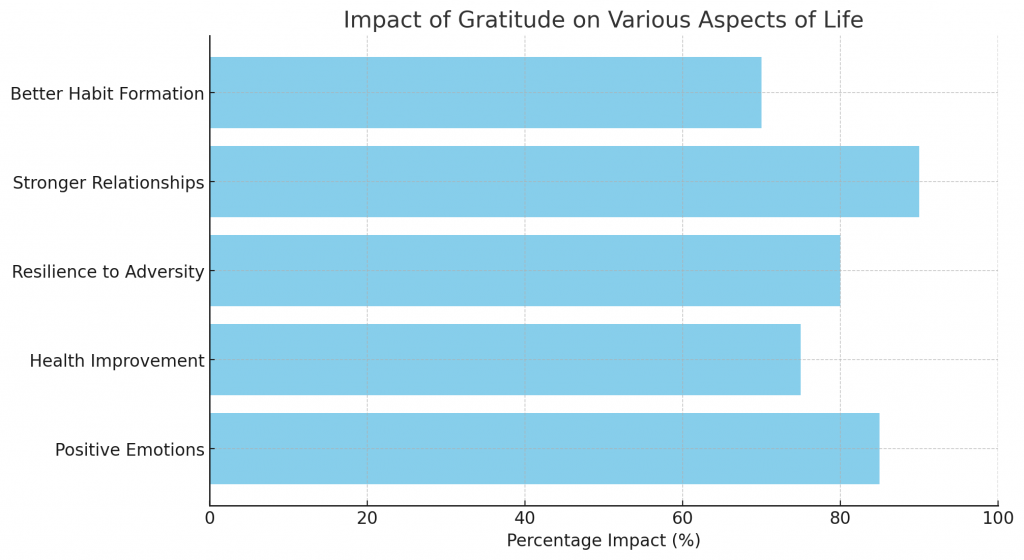| Key Takeaways |
|---|
| 1. Understanding the concept of gratitude and its impact on mental health. |
| 2. Exploring practical ways to cultivate gratitude in daily life. |
| 3. The benefits of keeping a gratitude journal. |
| 4. How gratitude can help in forming good habits and lowering stress. |
I. Introduction to Gratitude
In a world bustling with ambitions and challenges, it’s easy to overlook the small wonders and achievements that make life meaningful. “Things to be grateful for” is not just a phrase; it’s a perspective that can dramatically shift how we interact with our world. Gratitude, at its core, is the quality of being thankful and a readiness to show appreciation for and to return kindness.
II. The Science Behind Gratitude
Research in psychology has shown that gratitude is strongly associated with greater happiness. It helps people feel more positive emotions, relish good experiences, improve their health, deal with adversity, and build strong relationships. When we practice gratitude, we acknowledge the goodness in our lives, and this act often helps us recognize that the source of that goodness lies at least partially outside ourselves.
III. Everyday Practices to Cultivate Gratitude
A. Reflecting on Simple Pleasures: Start by acknowledging the simple joys—be it the warmth of the sun, a pleasant conversation, or a well-made meal. B. Expressing Thanks: Make it a habit to thank people for their efforts and kindness, no matter how small. C. Mindful Appreciation: Be present in the moment and appreciate your current experiences, rather than always wanting more.
IV. Gratitude and Mental Health: Lowering Cortisol Levels
Gratitude isn’t just about feeling good. It has tangible health benefits. By focusing on the positive, gratitude can help in lowering cortisol levels, the body’s stress hormone. This is crucial for maintaining mental health and well-being.
V. Gratitude in Habit Formation
Incorporating gratitude into our daily routine can also be a stepping stone to building good habits. When we appreciate the small victories in our habit-building journey, we’re more likely to stick to our goals and feel fulfilled.
VI. Journaling as a Tool for Gratitude
Keeping a gratitude journal is a powerful way to cultivate a habit of appreciation. By regularly documenting things we’re thankful for, we can train our minds to focus on the positive, leading to improved mental health and resilience.

The visualization above demonstrates the significant impact of gratitude on various aspects of life, such as enhancing positive emotions, improving health, fostering resilience to adversity, strengthening relationships, and aiding in better habit formation. These areas highlight the transformative power of a grateful mindset.
Deepening Gratitude: Psychological Benefits and Relationship Enhancement
VII. The Psychological Benefits of Gratitude
Gratitude is more than just feeling thankful. It’s a deeper emotional state that can lead to long-lasting psychological benefits. Grateful people tend to be happier, as they focus on the positive aspects of their lives rather than dwelling on negatives. This positive outlook can lead to lower levels of stress and depression.
VIII. Enhancing Personal Relationships Through Gratitude
One of the most profound effects of gratitude is seen in relationships. When you express gratitude towards someone, it not only boosts your happiness but also strengthens the bond. It creates a cycle of positivity and appreciation, leading to more fulfilling and lasting relationships.
IX. Gratitude and Self-Reflection
Gratitude goes hand in hand with self-reflection. It encourages individuals to think about their life, their achievements, and the people who have helped them along the way. This practice can lead to greater self-awareness and personal growth.
X. Integrating Gratitude with Other Self-Improvement Practices
Gratitude can be seamlessly integrated into other self-improvement practices like meditation, mindfulness, and cognitive-behavioral therapy. It complements these practices by reinforcing positive thought patterns and emotional well-being.
Gratitude in Professional Growth and Overcoming Challenges
XI. Gratitude as a Catalyst for Professional Success
Embracing gratitude in the workplace can lead to numerous benefits. It encourages a positive work environment, enhances teamwork, and can even boost productivity. Recognizing the efforts of colleagues and expressing gratitude can also foster a culture of appreciation, leading to improved job satisfaction and motivation.
XII. Overcoming Life’s Challenges with Gratitude
Life inevitably presents us with challenges, but gratitude can be a powerful tool in navigating these. By focusing on what we’re thankful for, even during tough times, we can maintain a positive outlook. This resilience helps in coping with stress and adversity, allowing us to emerge stronger.
XIII. Innovative Gratitude Exercises
- Gratitude Walk: Take a walk and identify things around you that you’re grateful for. This could be nature, the neighborhood, or simply the ability to walk.
- Gratitude Letter: Write a letter to someone who has made a positive impact in your life but whom you’ve never properly thanked.
- Gratitude Visualization: Spend a few minutes visualizing a day where everything goes right. Acknowledge how this makes you feel and the elements you’re grateful for.
XIV. Conclusion: The Endless Benefits of Gratitude
Gratitude is more than a mere emotion; it’s a lifestyle. By regularly practicing gratitude, we can enhance our mental health, improve relationships, overcome challenges, and even excel professionally. It’s a simple yet profound tool that can transform our lives in countless ways.